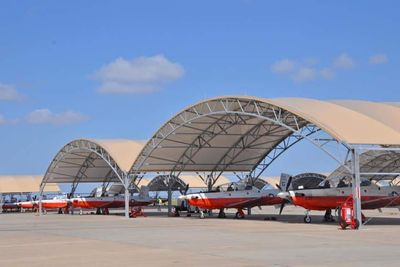seeing green
Houston geothermal co. expands DOD partnership with South Texas initiative

Sage Geosystems will onboard its technology at the Naval Air Station in Corpus Christi. Photo via Naval Air Station Corpus Christi/Facebook
Expanding on its partnership with the United States Department of Defense's Defense Innovation Unit, Sage Geosystems has been selected to conduct geothermal project development initiatives at Naval Air Station in Corpus Christi.
Along with the Environmental Security Technology Certification Program, Sage will provide its proprietary Geopressured Geothermal Systems technology, will be able to evaluate the potential for geothermal baseload power generation to provide clean and consistent energy at the Naval Air Station base.
“We’re pleased to expand our partnership with the DOD at NAS Corpus Christi to demonstrate the advantages of geothermal technology for military energy independence,” Cindy Taff, CEO of Sage Geosystems, says in a news release.
Sage is also conducting initiatives at Fort Bliss and has completed an analysis at the Ellington Field Joint Reserve Base. The analyses could “pave the way for expanding geothermal energy solutions across additional U.S. military installations,” according to Sage.
The company’s proprietary technology works by leveraging hot dry rock, which is a more abundant geothermal resource compared to traditional hydrothermal formations, and it provides energy resilience for infrastructures. In addition, Sage is building a 3 megawatt commercial EarthStore geothermal energy storage facility in Christine, Texas, which is expected to be completed by December. Sage also announced a partnership with Meta Platforms. With Meta Platforms, Sage will deliver up to 150 megawatt of geothermal power generation east of the Rocky Mountains.
The Naval Air Station Corpus Christi is considered a critical training and operations hub for the U.S. Navy, and the partnership with Sage shows the Navy's commitment to achieving net-zero carbon emissions by 2045. Sage’s technology will be assessed for its ability to create a microgrid, which can reduce reliance on the utility grid and ensure power supply during outages.
“As we advance our Geopressured Geothermal Systems, we see tremendous potential to not only provide carbon-free power, but also strengthen the operational capabilities of U.S. military installations in an increasingly digital and electric world,” Taff adds.
In September, the Air Force awarded Sage a grant of $1.9 million in a first-of-its kind contract to determine whether a power plant using Geopressured Geothermal Systems is able to generate clean energy needed for a base to achieve energy resilience.